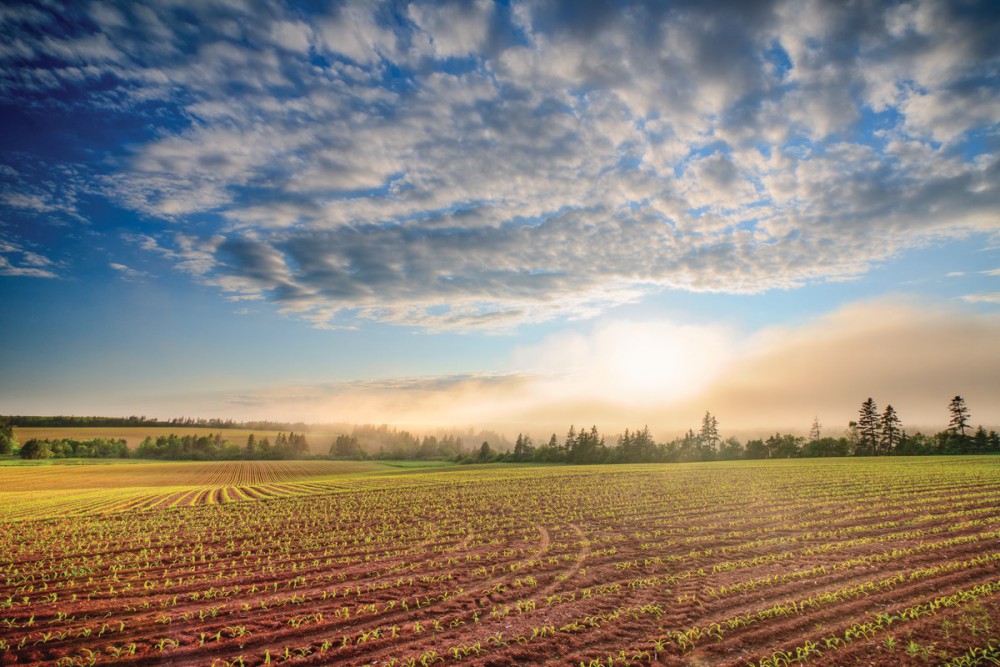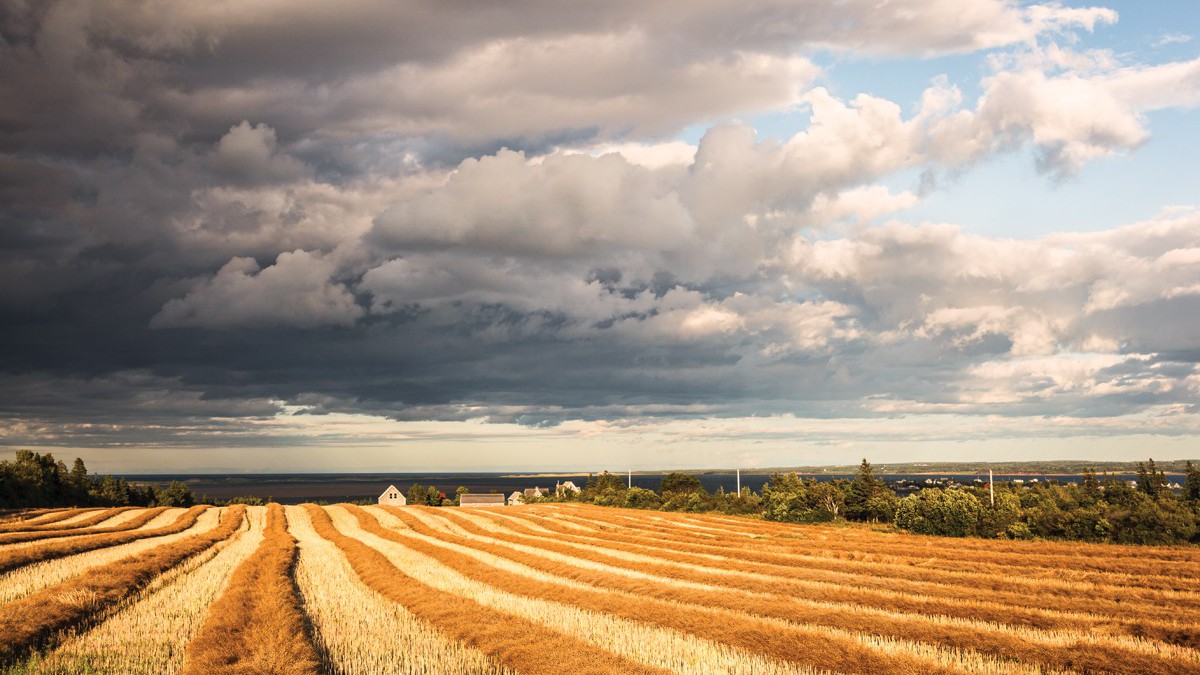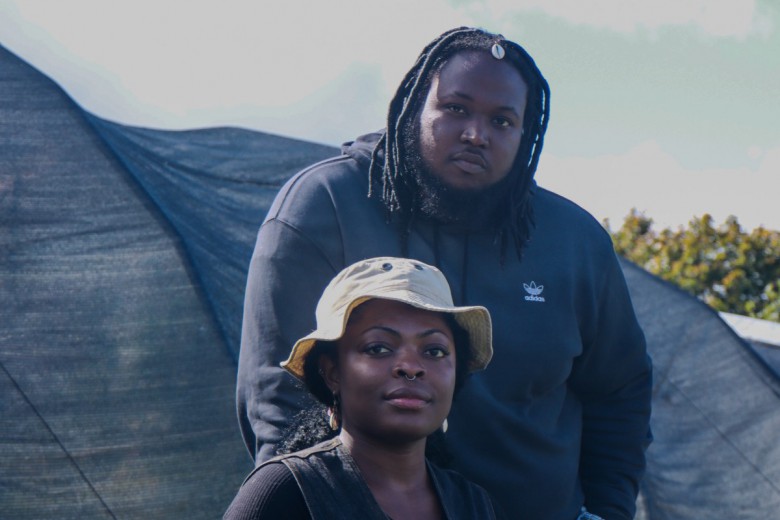In the pastoral land of red cliffs, lush meadows, and Anne of Green Gables, the small-scale farming for which Prince Edward Island is renowned has been quietly under attack by corporate giants for decades. While tourists may still see a picturesque landscape on the so-called “gentle island,” Islanders see farms being foreclosed at an unprecedented rate, fish kills due to the over-application of synthetic pesticides, and our future quite literally receding into the ocean.
Agribusinesses on P.E.I. are often vertically integrated, meaning they “control the seed, the growers, the processing, the trucking, the box-making and all of the pesticides and all of the fertilizers,” says Ann Wheatley, an organizer for food justice and migrant worker rights with the Cooper Institute. “There are a couple of the corporations [like Cavendish Farms and McCain Foods] that really have all of those angles covered, so they have complete control and then they also have a lot of political power because they’re wealthy,” she tells me.
Under food sovereignty, everyone should have access to safe, nutritious, culturally appropriate food that is grown fairly by a community and for a community.
While corporate influence in agriculture is a major problem across Canada, it is particularly apparent in P.E.I., where agriculture and the fisheries are basically our entire economy. In opposition to this corporatization, the fight for food sovereignty has emerged in P.E.I. over the past few decades.
As a movement, food sovereignty radically undermines the corporate industrial model of agriculture that seeks to eliminate the family farm, destroy our environment in favour of profit, and concentrate control of basic resources in the hands of a few elite players. A concept that originated in the mid-1990s with the Latin American peasant movement La Via Campesina, food sovereignty asserts that the people who produce, distribute, and consume food should have the right to define their own food systems and policies – not corporations and market institutions. Under food sovereignty, everyone should have access to safe, nutritious, culturally appropriate food that is grown fairly by a community and for a community.
The green revolution
Throughout the mid-20th century, the Western world experienced a fundamental shift in the way we practise agriculture due to changes in technology and post-war food shortages. The green revolution – an attempt at agricultural industrialization and increasing crop yield – encouraged liberal applications of synthetic fertilizers and biocides (pesticides, herbicides, and fungicides), the use of heavy machinery such as large tractors and combine harvesters, and the distribution of genetically altered or hybridized seeds. Power over global agricultural inputs has become increasingly concentrated since the green revolution, and three companies – Bayer, Syngenta, and BASF – control roughly half of the global agrochemical market. About 80 per cent of U.S. corn and more than 90 per cent of U.S. soybeans are owned by Monsanto (now Bayer).
The green revolution has greatly benefited agribusinesses, as fertilizer, seed, and farm equipment companies still capture the majority of agricultural profits in Canada. The total value of all primary agricultural goods produced from 1985 to 2011 in Canada was over three-quarters of a trillion dollars, yet 100 per cent of profits were reaped by agribusinesses, while farmers have seen their net debt increase over the same period.
Three companies – Bayer, Syngenta, and BASF – control roughly half of the global agrochemical market.
P.E.I. was slow to adopt green revolution technologies, but passed the Comprehensive Development Plan in 1969, with federal financial support. It sought to “modernize” the P.E.I. economy, and off-Island experts were brought in to eliminate inefficiencies in the agricultural sector. The small-scale family farm became their target, and legislation was designed to favour large industrial farm operations through subsidization.
In 1971, during the height of tourist season, thousands of Island farmers blockaded the main highways with their tractors in a protest organized by the National Farmers Union (NFU). After a tense standoff with the RCMP outside of a ferry terminal in Borden, where farmers had formed a human chain to block the terminal, the P.E.I. government agreed to develop legislation protecting the family farm through limiting foreign land ownership and placing an upper acreage limit on farm operations.
In 1971, during the height of tourist season, thousands of Island farmers blockaded the main highways with their tractors.
While much has changed on P.E.I. since the early 1970s, a guiding principle remains: Islanders will not accept the corporatization of our province without a fight. However, the power of corporate giants is significant, as potato magnates Cavendish Farms (owned by the vast oil empire, the Irving Group) and McCain began to dominate P.E.I. agriculture in the latter 20th century and brought the corporate, industrial model of agriculture with them. Both of these corporations are based off-Island, meaning that they exploit our land and environmental resources while remitting the profits to mainland investors.
The dangers of monocropping
When you think of P.E.I., you think of potatoes. Of the $497 million that the agricultural sector contributed to the P.E.I. economy in 2013, over half was generated through potato production and distribution. Though the provincial government requires farmers to rotate the location of crops every three years, monocropping has still taken an environmental toll. As a root vegetable, potatoes leach nitrogen out of the soil – and the vast acres of potato farms have severely degraded soil quality on P.E.I. over the last twenty years.
Farmers who are forced to work under the corporate model will typically apply massive amounts of nitrogen and phosphorous-based synthetic fertilizers and biocides to the fields to increase crop yield. Corporations like Nutrien – formed from a merger of PotashCorp and Agrium – benefit, while farmers barely scrape out a living.
“If you want to keep your land in good shape you need livestock and their manure to be able to have that rotation, and soil with enough organic matter to continue [healthy growth],” Reg Phelan, a seventh-generation organic farmer from Morell, P.E.I., tells me. “With monoculture potatoes, I think the writing’s on the wall: they just can’t continue because there’s nothing to hold their soil together. Some of the measured [soil] runoffs couldn’t find any organic matter in it.”
“With monoculture potatoes, I think the writing’s on the wall: they just can’t continue because there’s nothing to hold their soil together.”
During rainy P.E.I. summers, runoff from these pesticide-laden fields can enter waterways, killing entire schools of freshwater fish overnight. Since 1962, there have been 51 pesticide-related fish kills on P.E.I. of various severities. Like a canary in the coal mine, fish kills often serve as indicators of severe environ-mental distress.
The corporate model of agriculture is also heavily invested in the fossil fuel industry – the Irving Group, for example, operates Canada’s largest refinery in Saint John, New Brunswick. And it makes sense that vertically integrated agribusinesses are also invested in oil: the machinery necessary to sustain and process artificially high crop yields guzzles fossil fuels, and in turn expels vast amounts of carbon dioxide. I don’t think it has sunk in yet for most Islanders that, as a low-lying island, we will be the among the first in the country to be swallowed by rising sea levels caused by climate change. Although I am only 21 years old, I have already seen our natural landscapes shift and change due to increased erosion. As an Islander, one of my deepest fears is that my home will cease to exist for future generations.

A keystone industry
In the past 50 years alone, the number of potato farms on P.E.I. has decreased from over 5,000 to under 250. In number, farms are shrinking, but in size, they’re growing – meaning that fewer Islanders are able to make a living from farming. In a province with some of the highest unemployment and household poverty rates in Canada, the unsustainable future of farming – our keystone industry – is incredibly concerning to Islanders.
According to a farmer from Queens County, P.E.I., fewer young people on the Island (and across Canada) are getting into farming. “It’s related to the huge barriers to entry [for farming] like securing land and equipment, which – even at a small scale – is tens of thousands of dollars of investment just to get started. Sure, people can rent land, but you would have to know enough to begin with. I think that a [lack] of knowledge and capital – to boil it down – are the two main barriers to entry, but they’re really interdependent.” This farmer asked to remain anonymous, explaining that he’s new to farming and is worried that speaking frankly about its challenges will have negative financial consequences.
In number, farms are shrinking, but in size, they’re growing – meaning that fewer Islanders are able to make a living from farming.
The knowledge and capital necessary for successful farming have become concentrated in the hands of a few elites, and our generation is losing our common agricultural heritage. We have acted on the assumption that the corporate industrial food model is here to stay, but something has to give in the current system.
Family farm fight-back
Phelan was born into a farming family. He’s an NFU board member and the Atlantic Canadian representative for the international program committee of La Via Campesina. On Phelan’s farm, “We grow a lot of different crops because we’re looking for a local market,” he tells me. “When people go to a market they want a lot of variety, so that’s why we [grow] as many as 30 different vegetables. And being diversified on a farming operation is better for the land, better for the [crop] rotation and for [disease resistance].”
Family farmers on the Island are resisting the corporate model through agro-ecology: the recognition that we can, and should, farm with environmental sustainability as a priority. As a certified organic producer, Phelan refuses to use synthetic fertilizers or biocides on his farm, and also tries to limit the amount of water used through irrigation systems. Phelan is also a member of the Seaspray Organics Co-operative, along with the farmers across the road, and together their produce is distributed through farmers’ markets and CSA (community-supported agriculture) veggie boxes.
Family farmers on the Island are resisting the corporate model through agro-ecology: the recognition that we can, and should, farm with environmental sustainability as a priority.
This is a typical market profile for a small organic producer on the Island, as farmers must use a variety of marketplaces to avoid selling to big box grocery stores. While some local farmers sell to the Superstores and Sobeys, larger grocery stores are often unwilling to work with or fairly compensate small-scale organic producers, whose crop yields are less certain. Despite the abundance of fresh local produce on P.E.I., local food options are often more expensive, and big box stores capture most of the market. According to Wheatley, “Another huge challenge is the fact that we have so many people who are living in poverty or close to living in poverty and can’t afford to make the kind of food purchasing decisions that are really fundamental to a healthy local food system.”
It is a failure of the capitalist system that a case of strawberries grown five minutes from my house is more expensive than those from another country. Many farmers have called upon the provincial government to implement higher minimum wages – which they did, in April – or a basic income program to allow consumers to purchase local, environmentally friendly food.
When Sally Bernard from Barnyard Organics’ grain and livestock farm started farming with her partner, they wanted to protect the land they farmed, and “for the love of the soil” quickly became their motto. To maintain soil health they apply healthy doses of manure, rotate crops frequently as a natural form of pest management, and apply cover crops during the harsh Island winters to prevent topsoil erosion.
But strict regulations in Canada surrounding eggs and poultry – designed with large producers in mind – are making it difficult to sell their ungraded eggs or maintain their Rent-the-Chicken program, which provides backyard chickens and supplies to locals for the summer. “We’d rather see 100 farms with 100 or 500 chickens rather than one farm with 500,000 chickens,” says Bernard. “Our chickens can be outside running around right now, because we have 160 of them. […] We’re letting things live as they should.”
It is a failure of the capitalist system that a case of strawberries grown five minutes from my house is more expensive than those from another country.
In a recent example of food sovereignty in action, some Mi’kmaw people on the island have started the Three Sisters Teaching and Knowledge Garden on land returned by Sweet Clover Farm in Valleyfield, P.E.I. “Three Sisters” refers to the practice of companion planting used by various First Nations across North America. This garden produces three crops: flint corn, beans, and squash. Corn, which leaches nitrogen from the soil, is interspersed with beans, which naturally replenish nitrogen. Squash provides moisture to the soil, and its broad leaves block sunlight to weeds. According to Jenna Burke, a mentor for Indigenous students at the University of Prince Edward Island who was involved in the project, “There’s just a lot of teaching and learning and revival of culture that we can do through just planting seeds – something that we’ve always done and almost was lost.” P.E.I. is the unceded territory of the Mi’kmaq, but Mi’kmaw farmers are relatively few, as farmland is typically owned and passed down within settler families due to laws in Canada that restricted First Nations to small reserves of often undesirable land. The recognition that food is sacred is a primary tenet of food sovereignty, and this garden allows Mi’kmaw gardeners to reclaim their culture and land from settlers.
Against industrialization
Randall Affleck, a fifth-generation dairy farmer from Bedeque, joined the NFU as a young farmer in the 1980s. “They did a lot over the years to hold back the tide of industrial agriculture,” he tells me.
Of all the agricultural organizations on P.E.I., the NFU is the one that most consistently stands against the total industrialization of Island farms. They were a guiding force behind the landmark Lands Protection Act, which placed strict upper acreage limits on farms. They have consistently called upon the provincial government to stop subsidizing large-scale farming at the expense of family farmers, and have implemented mentorship programs for young farmers, especially young women.
Industrialization is “a big wave, and [we] keep losing producers over it,” continues Affleck. “I think society will regret that they let that happen in the future. But that’s kind of where it’s gone – so when the constituency that [the NFU is] representing keeps getting uprooted, it’s harder and harder for the organization.”
Industrialization is “a big wave, and [we] keep losing producers over it.”
More recently, the NFU has co-operated with local community organizations like the Cooper Institute to campaign for the rights of migrant workers, and for the implementation of a basic income pilot project to combat high poverty rates on the Island. According to Phelan, “the biggest [issue] in farming is that its pay is precarious in terms of what’s going to sell, what the prices are going to be – so it’s hard for young people to get started and learn the ropes. But if you had a basic income guarantee it would be great for someone getting started with a small farm.” A basic income would also allow consumers to make more localized food choices.
The NFU rejects funding from agribusiness corporations, unlike other local farm organizations such as the P.E.I. Federation of Agriculture, whose annual general meeting is sponsored in part by Cavendish Farms. “You can’t take their money and kick their arse in,” explains Affleck. “So if you identify a problem as a farmer in a rural part of Canada and you’re representing farmers and nobody else, you are going to speak truth to power.”
Forward-thinking food
The Maritimes is often treated as a footnote to Canada – and as a result, we underestimate our own ability to resist the capitalist system because our resistance does not typically resemble that of urban centres. While we may not picket frequently or lead marches, resistance is taking place in everyday interactions guided by farmers who refuse to see food as a commodity. These are farmers who prioritize the environment and our future, and who reject the corporate model of agriculture even though it often provides a steadier income. P.E.I. is a have-not province, and too often working-class people are convinced that we must work within oppressive systems out of economic necessity, instead of leading an outright revolution ourselves.







